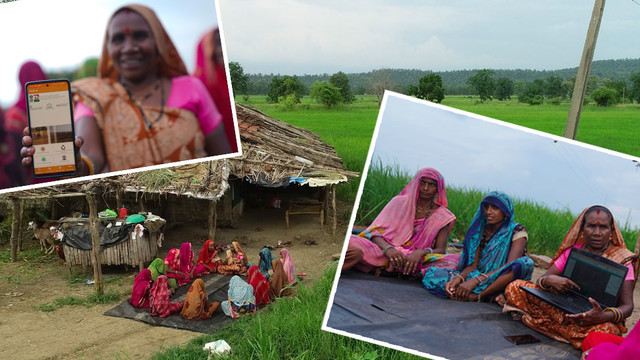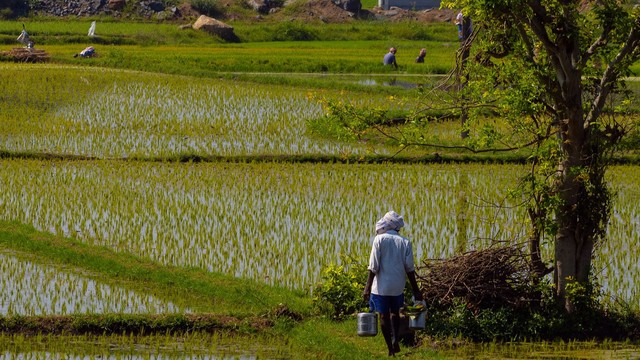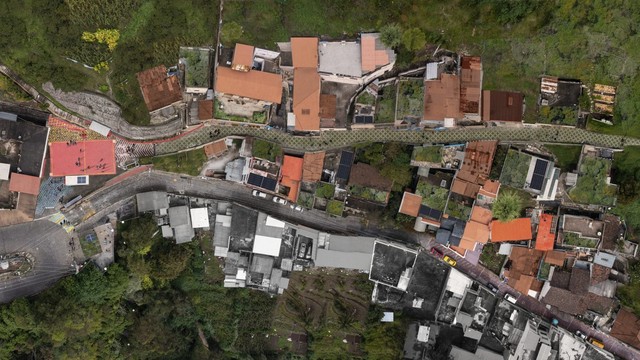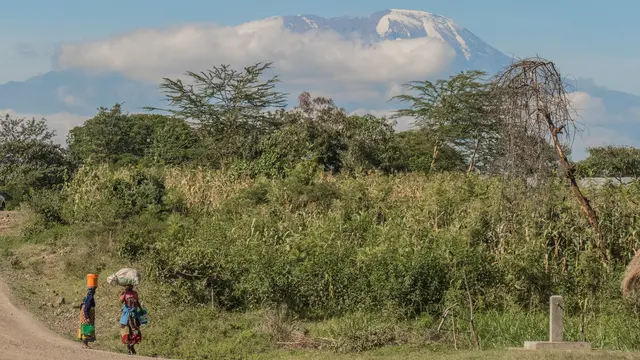Conflict resolution: a key part of adaptation in North Darfur
As CBA9 gets under way in Nairobi, Kenya, Jodi Sugden from Practical Action highlights how work on conflict resolution is a key part of the adaptation process.


In Kebkabiya, North Darfur, the NGO Practical Action has been helping communities prevent conflict between farmers and pastoralists by encouraging the construction and rehabilitation of watering points (Photo: Margaret Gardner, Practical Action)
‘Measuring and enhancing adaptation’ is the key theme at this year's Community-Based Adaptation conference in Kenya, where Practical Action will be highlighting the importance of developing community capacity.
In the long term, measuring and enhancing adaptation cannot be done by international development agencies and short-term projects – what is needed is sustainable, local institutions that can monitor, adjust and enhance local adaptation efforts.
In North Darfur, Practical Action has been working to support the creation of such institutions, and to enhance long-term adaptive capacity.
Climate change and conflict
Climate change is expected to lead to increasing competition for and conflict over natural resources, particularly water and land. The ability of communities to resolve these conflicts, so they can get on with their livelihoods, should therefore be considered an important part of adaptation.
Kebkabiya in North Darfur is one of the region's most important agricultural areas, traversed by one of Sudan's longest pastoralist migration routes. Increasing incidence and severity of drought in North Darfur has led farmers to migrate into traditional pastoralist corridors, exacerbating an ongoing conflict over land and water.
Preventing conflict in North Darfur
Practical Action has been working in Kebkabiya since 2013 to support nine target farming and pastoralist communities to find innovative, sustainable ways to manage their natural resources and resolve and avoid conflict.
In each of the nine communities, we have worked to set up community-based organisations, composed of women, youth, local leaders, and those displaced by the conflict. These organisations have been trained in conflict analysis and early warning, conflict resolution and peacebuilding, and conflict-sensitive development.
The organisations led a Participatory Action Planning Development process, engaging with their respective communities to identify, analyse and prioritise their livelihood and development needs. This helped to build consensus between different stakeholders to determine a fair, environmentally conscious and sustainable approach to the use and management of natural resources.
The organisations are also now responsible for monitoring natural resource use, and potential and actual conflict in their local area. They record information on:
- Dispute cases classified by type (e.g. individual/family/community, and/or farmers/pastoralist)
- Causes of dispute (e.g. natural resources, political, ethnic)
- How many cases raised; how many resolved, and
- Nature and terms of agreements reached between disputing parties; and effectiveness of their implementation.
Potential disputes are referred to a local 'Peace Committee', composed of members from all the major local tribes. The committee meets to analyse the causes of the conflict, and if possible, resolve it. If it cannot be resolved, or if it involves external actors, it is referred to a 'Supra-Locality Peace Committee' that meets with the highest level local leaders and other influential figures to try to reach an accord.
Local institution building has been the core of our work in Sudan but we have also encouraged practical steps to reduce local competition over natural resources. These have included:
- Spreading pasture seed to increase grass cover, and formation of improved seed banks
- Demarcation of migratory routes
- Establishing community forests and nurseries
- Constructing or rehabilitating 27 water points
- Providing agricultural and livestock extension services, and
- Vocational training in carpentry, masonry, social services and basic health care for 145 unemployed youth.
These activities have proved essential for building trust between communities, and for reducing pressure on limited resources.
Maintaining the peace
As a result of this project, communities, local community organisations and Peace Committees are able to pro-actively identify potential sources of conflict and take remedial action. The community-based organisations take the lead in identifying the needs of their communities, translating these into community action plans and promoting peace between diverse groups. Of 230 cases submitted to the Peace Committees, 170 have been resolved at the local level.
In 2014 pastoralists in the region and displaced communities signed an historic agreement, allowing the latter to return to their lands for the first time in more than a decade. A key local market, closed since the start of the conflict in 2003, has also been reopened.
The aim of this project was to support communities in creating new ways of monitoring and enhancing their ability to adapt to the changing environment in the long-term.
The community-based organisations are staffed by volunteers, and so to avoid the possibility of 'volunteer burn-out', the organisations have been entrusted with funding which can be used to create opportunities to improve livelihoods, increasing income, and providing incentives for continued involvement.
Mohamed Siddig Suliman, area coordinator for Practical Action Sudan, will be presenting this project at CBA9 on 29 April.
For further information about Practical Action at CBA9, check out the blogs on our CBA9 website.
Jodi Sugden (jodi.sugden@practicalaction.org.uk) is a policy assistant at Practical Action.



